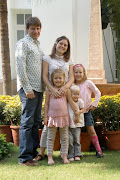This past weekend, I went to the Jaipur Literature Festival, or at least the first two and a half days of the five-day event. I went with a close friend of mine from Delhi named Mujibur Rehman, a professor in Minority Politics at Jamia Millia Islamia and founder of Delhi’s EM Forster Literary Society.
We enjoyed the event overall and were pleased to attend sessions where various prize-winning authors spoke. Yes, we’re talking Nobel Prizes (2), Pullitzer (7), Booker (5), and that’s just the big ones. It seemed that most of the over 200 authors were packing some sort of prize or other under their sleeves. On Saturday night, they even inaugurated a new prize – the DSC Prize for South Asian Literature, named after the festival’s primary corporate sponsor. A young Pakistani immigrant to the US named HN Naqvi won the $50,000 award for his debut novel, Home Boy.
We were impressed with how big the event has become, but we were also a little disappointed in terms of our experience. The event was very crowded, so we did a lot of standing and pushing and being pushed. Actually, it wasn’t that unpleasant. Apparently, in the festival’s short history (now seven years in its different forms), they have been forced to keep expanding. I heard one of the organizers, William Dalrymple, say that next year they’ll have to double the size of the venue again, just as they did from last year. It must be a good sign for literature in India.
First, it’s impossible to take in the whole event because there are always at least four talks going on at the same time in four different venues. So you have to make choices every hour and sometimes those choices are difficult, especially when you don’t know all the speakers and when the titles of their talks are nebulous or downright misleading. But I did manage to hear some very good speakers, and some that were not so good. Perhaps none were more entertaining than Ben MacIntyre as he talked about his non-fiction book entitled Operation Mincemeat, a fascinating account of a real life spy mission by British military intelligence during Second World War. Amazing story, very well presented.
Some of the discussions were very politically charged, such as those dealing with the occupation of Iraq and related conflicts in Afghanistan and Pakistan. Several prominent journalists spoke very articulately, passionately, and empathetically.
As a fellow writer at the festival, I listened carefully to the writers and took everything quite personally. I had, after all, come to Jaipur primarily to enjoy, to learn, and to be inspired to write. For me, with those goals in mind, the festival was a success. If there was a message that I kept hearing, behind the various voices, it was this: “Mark, just keep writing. Find your own voice, and persevere.”
Perseverance was a common theme whenever the task of writing was talked about. More than a few of the featured authors confessed to being lazy, which means that they learned to deal with themselves and to discipline themselves, at least occasionally.
Orhan Pamuk, a Turkish novelist, and one of the Nobel Prize winners in attendance, was very candid about the need for perseverance in his journey as an artist. He talked about himself as a “failed painter” and also an architectural school dropout. When asked about how he dealt with these disappointments, Pamuk simply said, in his charming accent, “My father gave me pocket money.” He went on to explain how difficult it was early on as an unpublished writer. He said, “I was embarrassed, but I persevered.” His books today have sold over seven million copies and are translated into over fifty languages. Thanks, Orhan.
Junot Diaz is a Dominican-American writer from New Jersey who now teaches creative writing at the Massachusetts Institute of Technology. I almost walked away from the first session that I heard him speaking at because his accent and strong language grated on me so harshly. I persevered, however, and was the better for it. He was very articulate as he spoke about the identity and purpose of the writer, and the need for the writer to be true to their art. At certain points in the session, it was as if he was speaking to me. This is a little taste of what he said: “Every artist (writer) is trying to say something new, something unique. Artists have to get over seeking approval from others. The good artist is not looking to make new friends through their art. They need to focus on what they need to say. You show you are a good artist through perseverance. And perseverance builds strength, even if it doesn’t always lead to success in the market place.” Gracias, Senor Diaz.
One of the highlights of the event for me was hearing Ruskin Bond on Sunday morning. Even though I have been to Bond’s hometown of Landour-Mussoorie many times, and even stayed next door to him on numerous occasions, I had still never seen nor heard him in person. In Jaipur, Bond was introduced, and cheered, as India’s favorite storyteller, which is especially interesting because, well, he’s very white and sounds very British. He has, however, lived his entire life in India and has indisputably claimed India as his home, as she likewise has claimed him as her favorite storyteller.
Mr. Bond was as amiable as anyone who was featured on the stage at the festival and, as the elder statesman at the event, he had that very free I’ve-got-nothing-to-prove air about him. He told a couple stories, read a couple excerpts from his books and recited a couple poems, one of which he candidly pulled out of his pocket and read from a piece of scrap paper. He also told a nice story from the time before book fairs and festivals when, as a young writer, he walked into a small bookstore in his hometown to see if they were selling his book. After a careful search of the stacks, he found his collection of short stories on the bottom of a large pile of bestsellers. Nonchalantly, he put the book back on the top of the pile, vainly hoping to promote its sale. His clever move, however, did not escape the notice of the bookshop owner who promptly came over to investigate. The owner looked at the book and, not recognizing the author, he spoke honestly that the book wasn’t selling and probably wasn’t worth the three-rupee price tag. To spite the owner, Bond bought the book himself and walked out in a huff.
Bond was his usual witty and quotable self, but one of the things he said that was somehow re-assuring for me was a comment about the writer’s audience. He said, “Writers essentially write for themselves and for people like them.” That idea gave me a certain amount of confidence because I know myself fairly well and that basic knowledge takes a lot of the guesswork and/or research out of figuring out my audience when I write. I appreciate it when people simplify things for me. Thanks, Ruskin.
Another highlight was a session called “On The Road” featuring travel writing. Six travel writers simply took turns reading from their work. Personally, I found it very enjoyable. In his introduction to the session, William Dalrymple said, “Travel writing is one of the oldest forms of writing, pre-dating the novel by about four millenia.” Aside from the Gilgamesh epic, he cited the recorded journeys of the Patriarchs in the Bible as an early form of travel writing. As a student of the Bible, and a travel writer, I really liked that association.
As the travel writing session concluded, a young Indian woman from the audience thanked the six authors for writing about their travels. She marveled at the opportunity that their writing had given her to be transported to so many exotic places. Her gratitude was heartfelt due to the fact that, as she said, she could not afford to travel as these writers had done, nor could she write as well as them. I appreciated her comment and personally wondered whether if I have been given the privilege to travel (which I have) and the gift to write, do I then have a social responsibility to people like that young lady to write about my travels? I would gladly accept that role.
At festivals of this magnitude that draw such famous authors, book signings are a big deal. My esteemed friend, Mujib, got several very impressive autographs. For some reason, I’ve always had trouble doing that. In fact, I don’t think I’ve ever asked anyone for his or her autograph (except for that time when I bumped into the Pope in the hotel hot tub on his visit to Canada in 1975, but nobody had a pen or paper anyway). In Jaipur, it would have been nice to sit down and chat with some of the authors, but that clearly wasn’t going to happen at a mega-event such as this, unless you’re really pushy. Or really lucky, like I apparently was on one evening when a couple randomly sat down beside me. As it turned out, she was an author, Nandita Puri (whom I had sadly never heard of) and he was a famous Bollywood actor named Om Puri (who looked slightly familiar to me). She had taken the chair next to me but quickly got up and went, leaving her husband alone and an empty chair between us. I quickly began to notice how everyone within twenty feet of us was staring and smiling giddily. Then the onslaught began, admiring (and annoying) fans asking for autographs and photos with him. He handled it all graciously, though I couldn’t help but feel sorry for him. So I leaned over and said, “Why don’t you sit and talk with me? Because I don’t know who you are.” He laughed and shifted over and we began chatting. Nice guy. We talked about Delhi where he had lived for four years while he studied acting, and about Vancouver, which is one of his favorite cities in the whole world. He told me about working on a couple films in Canada, of which I later figured out I’d seen at least a couple of them. He also asked about my interest in writing, and after hearing about my limited experience as a ghostwriter of sorts he turned to me and said in quite a fatherly tone, “You should also write your own stuff.” Thanks, Om. Once Nandita returned, Om introduced me to her and she was equally pleasant and engaging. Frankly, it never even crossed my mind to ask for autographs.
I’ll close this rather long (and disjointed) reflection with another of my favorite quotes from the festival. I heard Ian Jack, a Scottish journalist, say it, but he apparently stole it from Richard Ford, an American novelist, who was also present. Anyway, they said, “Even writing a bad book is a lot of hard work.” Why did I like that? Well, it asks people to acknowledge that writing is a skill to be developed and at the same time it is a risk to be taken. In some sense, like all writers, I risk bad writing every time I write, but I also write and keep writing in an effort to write better.
And with that, thanks for reading.































